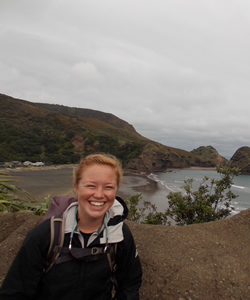I am currently sitting in a café drinking a “long black.” Instead of plain drip coffee, Kiwis drink a version of the Americano that has a higher concentration of caffeine. They take two shots of espresso and combine it with hot water to make a drink that is wildly popular here in New Zealand and across the Tasman Sea in Australia. I was taken aback the first time I went to a Starbucks and the barista did not know what I meant when I asked for just plain black coffee! Even the restaurants that remind me the most of home have intricacies that remind me I am away.
New Zealand has for the most part lived up to its reputation as an adventurous and beautiful country. There have been endless opportunities to hike along the ridges of mountains and sleep in huts far from any civilization. This disposition towards the outdoors and activities has been deeply ingrained in the Kiwi character since the first settlers came.
In the early 1800s British travelers endured the five month sea journey to New Zealand; they fully embraced the pioneer attitude and all that New Zealand could offer. Even now in cities, there are numerous clubs solely based on tramping (the Kiwi version of hiking), scuba diving, kayaking, climbing, and so much more. This widely embraced devotion to the outdoors leaves little free time for other leisure activities. I have noticed that the locals have put religion on the back burner in order to spend more time following their passion elsewhere.
The dominant religion in New Zealand is Christianity, with over half of the population (4.4 million) as followers. However, only 15 percent of New Zealanders regularly attend church. So despite the numbers, religion is scarce. While traveling through small towns in America, you can be sure to spot the church and the post office at the center of the town.
Around here, churches are far scarcer. Here you are bound to spot a sheep farm, a post drop box, but no church. Most of the locals that I have met have not even thought about their own personal view on religion. Georgetown is unique as a university because of the philosophy and theology requirements. Our knowledge of world religions is much greater than Kiwi students. Many Kiwis fundamentally value nature and all of the activities that it provides. I have found this to be a reason why there is a lack of interest in religion.
After many years of living in New Zealand, settlers began to see the need for a written agreement with the locals. Maori Chiefs signed the Treaty of Waitangi with British representatives on February 6, 1840. Although some British representatives were not planning to add anything about religion, a last minute article concerning freedom of religion was sneaked in.
Even with this “fourth article,” missionaries worked tirelessly to convert the native Maoris. Through schools and other provisions, missionaries did sway Maoris to convert. This enthusiasm lessened with time, especially through the 1970s and 1980s when Maori activists helped to revive their culture. Therefore, religion in New Zealand is nowhere near as prominent as it is in America.

